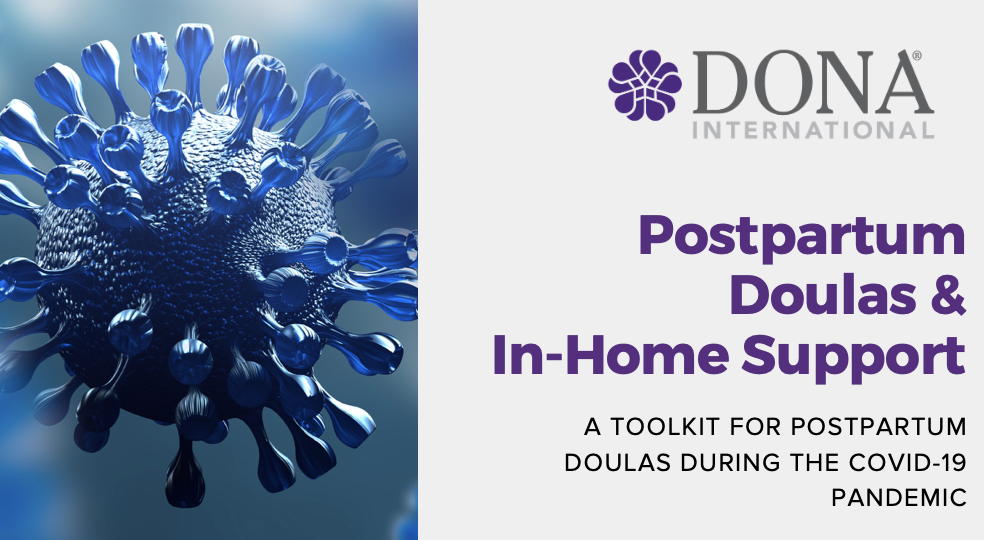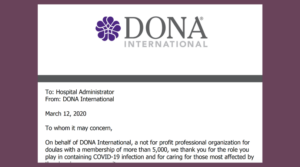Updated February 1, 2022
The DONA International education team has put together guidelines and considerations for our postpartum doulas when serving clients in the home during the on-going pandemic.
Postpartum Doulas and Corona Virus 
March 12, 2020 (Updated February1, 2022)
DONA International understands that COVID-19 is affecting the world in a unique way, and therefore we are providing information and support to our members and birth-workers globally in relation to COVID-19 as it relates to our work.
Doulas are an important part of the delivery care team and we sincerely hope that doulas will be able to continue to do the important work of supporting families through the birth and postpartum period. Now is the time for collaboration with clinical care teams while understanding our personal responsibilities. We call on doulas to exhibit excellent protective measures, as well as individual and client self-care for the health and safety of all involved. We also acknowledge that things may be a little different for a period of time and we want to offer guidance and support to doulas and birth workers.
Best practices and tips for doulas
 Understanding these are not normal times and that enhanced infection control procedures are needed in order to care for patients, DONA International urges all members and doulas to take necessary steps now and while assisting clients to ensure best safety practices. To this end, we have developed this toolkit to offer information specific to doulas in preparation for working with clients. Included in the toolkit are resources to help doulas identify symptoms of viruses (in themselves and their clients), encouragement to follow the direction of local and state public officials, as well as practical tips and considerations for doulas when working with clients.
Understanding these are not normal times and that enhanced infection control procedures are needed in order to care for patients, DONA International urges all members and doulas to take necessary steps now and while assisting clients to ensure best safety practices. To this end, we have developed this toolkit to offer information specific to doulas in preparation for working with clients. Included in the toolkit are resources to help doulas identify symptoms of viruses (in themselves and their clients), encouragement to follow the direction of local and state public officials, as well as practical tips and considerations for doulas when working with clients.
Regarding doulas attending births in the hospital setting
Recently, we have heard reports of hospital restrictions which could inhibit a family from working with their doula during labor and birth. As supported by both The American College of Obstetricians and Gynecologist (ACOG) and The Association of Women’s Health, Obstetric and Neonatal Nurses (AWHONN), doulas are an important part of the care team and provide informational and emotional support as well as comfort measures for patients during birth. Numerous clinical trials show that when doulas are present for families, healthier outcomes are possible. According to the Cochrane database, “Continuous support during labour may improve outcomes for women and infants, including increased spontaneous vaginal birth, shorter duration of labour, and decreased caesarean birth, instrumental vaginal birth, use of any analgesia, use of regional analgesia, low five-minute Apgar score and negative feelings about childbirth experiences.”(2017, Bohren et al.) At this time, it is our position that doulas should continue to be permitted into the birth room as an essential component of the patient’s well-being and care, and it’s our hope that any hospital visitor restrictions will exclude doulas.
Recently, The Centers for Disease Control and Prevention have published guidelines on caring for a patient with COVID-19, and recommend healthcare facilities follow, “infection control guidance on managing visitor access, including essential support persons for women in labor”, they go on to state, “if a restriction of all visitors is implemented, facilities can consider exceptions based on end-of-life situations or when a visitor is essential for the patient’s emotional well-being and care.” (Interim Considerations for Infection Prevention and Control of Coronavirus Disease 2019 (COVID-19) in Inpatient Obstetric Healthcare Settings, February 2020).
Additionally, The Association of Women’s Health, Obstetric and Neonatal (AWHONN) released the following statement in regard to doulas and COVID-19:
“AWHONN recognizes that doula services contribute to the woman’s preparation for and support during childbirth and opposes hospital policies that restrict the presence of a doula during a woman’s active labor.
“Doulas are not visitors and should not be blocked from caring for patients in the antepartum, intrapartum and postpartum period. Most doulas have been contracted by patients weeks to months ahead of time and have established provider relationships. They are recognized by AWHONN and ACOG as essential personnel and part of the maternity care team,” said AWHONN member Nancy Travis, MS, BSN, RN, BC, CPN, CBC, Florida Section Chair.
AWHONN supports doulas as partners in care and acknowledges their ability to provide physical, emotional, and partner support to women. AWHONN opposes hospital policies that restrict the presence of a doula in the inpatient setting during an infectious disease outbreak. Read more about AWHONN’s position on continuous labor support for every woman here.”
 As DONA International members seek to collaborate with local hospital administration, we have developed this letter on behalf of DONA International. DONA members may share this letter to hospital administration. We also strongly urge our doulas to increase their understanding of necessary safety precautions and to renew their willingness to work alongside clinical providers for the betterment of their clients.
As DONA International members seek to collaborate with local hospital administration, we have developed this letter on behalf of DONA International. DONA members may share this letter to hospital administration. We also strongly urge our doulas to increase their understanding of necessary safety precautions and to renew their willingness to work alongside clinical providers for the betterment of their clients.
DONA International recognizes how challenging COVID-19 is on health care providers, hospitals, and communities at large. We encourage mindful preparation and collaboration between healthcare teams, doulas, and families to work together for best perinatal and infant health outcomes during pregnancy, birth, and postpartum. Doulas are an essential part of the perinatal and infant care team and can offer much needed support to clients and their families during this time of heightened alert.


Trackbacks/Pingbacks